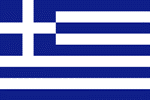 Greece's new prime minister has set out to resolve its longrunning problems with Turkey and Cyprus. Will he succeed? Greece's new prime minister has set out to resolve its longrunning problems with Turkey and Cyprus. Will he succeed?
A new left-of-centre government led by George Papandreou hit the ground running after winning the Greek elections of October 4. The new administration was in office within two days. Papandreou chose to take charge of the ministry of foreign affairs himself – as if the job of prime minister wasn't already enough in a country urgently in need of economic, educational and social reforms.
The electoral campaign was polarised between the established left-right Greek political divide. But one area of policy was a non-issue, omitted from the cheap rhetorical point-scoring: foreign policy.
There were two major parties in the running for government – New Democracy, of the former prime minister Kostas Karamanlis, and Papandreou's opposition Pasok party – but only one foreign policy. This absence of major differencessilenced foreign policy debate during the electoral campaign.But why is that the case?
For one, the economic and financial sector crises affecting Greek society did not leave much room for substantial foreign policy debates. Moreover, the three major issues on Greece's foreign policy agenda – relations with Turkey, the debate over the official name of the neighbouring Republic of Macedonia/FYROM (as it is labeled, for political correctness, in Athens) and the non-recognition of Kosovo – continue to be politically relevant and controversial. But Greece, and most of its political elite, has started to move on.
Only three days into office, Papandreou chose Turkey for his first foreign policy trip. He met with his counterpart Recep Erdogan and the Turkish foreign minister Ahmet Davutoglu, respectively. The symbolism of this initial diplomatic journey was not lost on Greek and Turkish commentators, as well as EU observers in Brussels. Turkey's EU aspirations were as much an issue as the UN-sponsored Cyprus talks. Papandreou was equally quick to hail the new agreement between Turkey and Armenia, seeking a normalisation of ties between both countries.
Do these first steps, as promising as they are, have enough substance to make a difference in the medium term? Critics and sceptics alike argue that the new prime minister is naive if he believes that he can successfully tackle two foreign policy challenges – Turkey and Cyprus – that have remained frozen for the better part of three decades.
But Papandreou has few alternatives to being daring from the outset. He will have to deliver quickly on the economic front. But he can gain additional political leverage if he moves decisively in foreign policy affairs. Home and away, stale ideas will just not do any more for Greece.
/The Guardian/
| 
